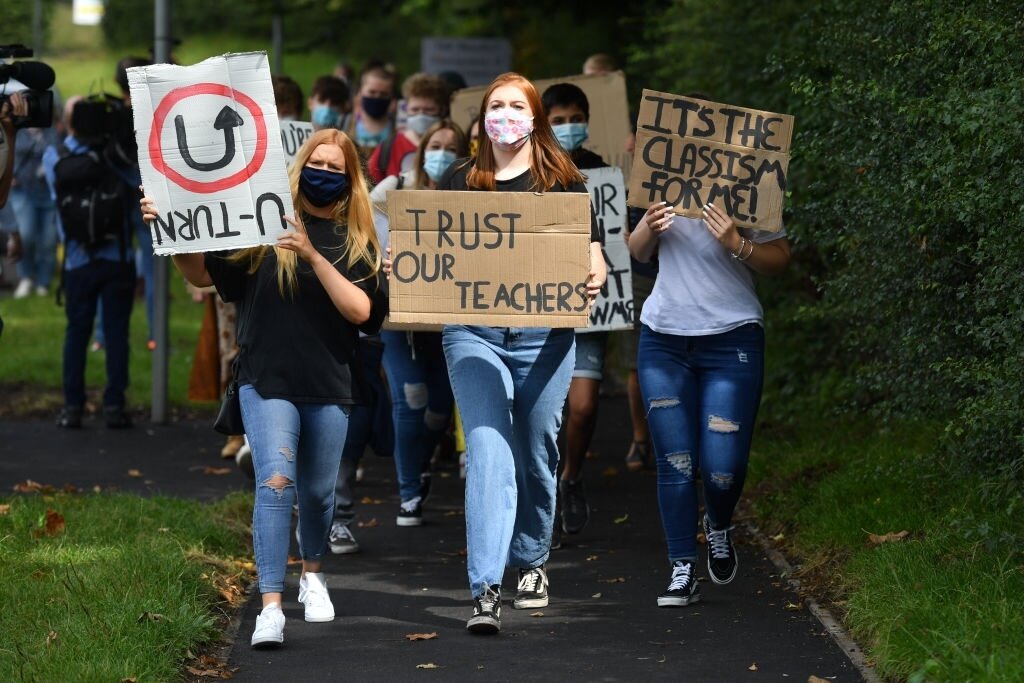The Commons: Structural Inequality in British Education
Jacob King/PA Images via Getty Images
British secondary and higher education in the UK have been put under a microscope in the last few weeks. The combination of students’ return to school alongside GCSE and A-Level results controversy has created a torrent of discussion around the future for British education. For many, this exam season lay bare what they had known for years: the institution of British education advantages certain groups, while leaving others behind. Private schools saw a rise in high marks at twice the rate of secondary comprehensives leading many to wonder if the system truly is designed to disadvantage poorer students.
Key to the exam results controversy is the Office of Qualifications and Examinations Regulation, better known as Ofqual, equation. The Ofqual equation relied on various inputs in order to predict student’s grades in the absence of seated exams. These inputs included student’s previous academic performance, the “predicted grade distribution of previous years,” and the academic record of the school. Ofqual’s succinct 4-term algorithm has caused a row not only in Westminster but in schools across the UK. The equation puts an emphasis on the schools’ past academic record and not on the students’ predicted grades, determined by teachers earlier this year before lockdown.
When asked for a response, Education Secretary and Conservative MP Gavin Williamson claimed that Ofqual had done “absolutely everything” it could to ensure fairness in the system. The efficacy and fairness of the equation itself is a matter of mathematical debate, but the clear-cut inequalities in British Education that the equation has spotlighted are irrefutable. Ofqual’s reliance on schools’ previous academic performance at its core shouldn’t have created an issue – what did is the preexistent and vast educational inequality found in the UK.
The Social Market Foundation, a “cross-party think-tank” based out of London, published a Commission on Inequality in Education in 2017. The report points out what has only been made clearer by this exam season. Regional disparities in education are of great concern for the future of the United Kingdom, but as the report notes, they “have remained stubborn and in some cases worsened over the last three decades.” Two of the main causes for this on-going issue are unequal access to high-quality education and differences in the level of parental engagement with a student's learning. With reference to the first cause, the report finds that “more experienced and highly-qualified teachers gravitate to schools whose children come from wealthier families, leaving children in poorer areas with lower-quality teaching and thus widening the gap between them.” The second cause reveals a more complex system of educational disadvantage accruing across socioeconomic lines. Since the mid-90s, researchers have agreed that “rates of parental involvement are lower in low-income communities than in higher income schools.” As the 2017 SMF report points out, this difference in parental engagement exacerbates a material inequality of resources – teachers, funding, etc – by adding an inequality of parental involvement. Essentially, richer children receive better quality teaching and generally, higher levels of parental engagement – giving them not only a material leg up, but a situational one as well. As to the question of why the role of parents in a child’s education, various reports detail the “academic and attitudinal benefits” of actively-engaged parents. Sufficit to say, academic inequality accrues along socioeconomic and regional lines in a bold way.
This research is relevant to the current situation as the Ofqual equation’s reliance on past academic performance of a school welcomes the persistence of preexistent regional inequalities in education and socioeconomic status. With Britain being “more geographically unequal than any other rich country,” these geographic and socioeconomic inequalities breed complex, multi-faceted issues – this year’s exams being but one example. Students’ at poorer schools saw less of a benefit from the equation than those at elite private schools not because of any difference in their individual academic performance, but purely because of the past performance of their specific school.
Map of regional gross disposable household income per head. Source: Office for National Statistics via University of Sheffield
Of concern for Conservatives in the midst of this conversation is that the “results debacle goes against their party’s raison d’etre.” For decades the Conservative Party has leaned to some extent on the Bootstrap Myth, the meritocratic idea that hard work and potential are rewarded, “no matter where you are from or your background.” In the case of the Ofqual equation, this Conservative cornerstone couldn’t be further from the reality. Ofqual explicitly used pupil’s academic and hence regional background as a core informant for their results. Both where a student was from and their academic background played a role – a reality that is antithetical to the beliefs of many Conservative MPs.
Failures of British education have been spotlighted in such a profound way that, for many teachers and professional academics, the future of the institution needs to be addressed – now. For years, the government has sat back while educational inequality has grown and teacher, student, and parent’s confidence in the system has fallen. In the words of the National Education Union, “Now is the time for the Government to sit down, with heads, teachers and their union representatives, to talk about how we can all deliver the best for the children we teach and restore confidence in our qualifications and exam system.”


